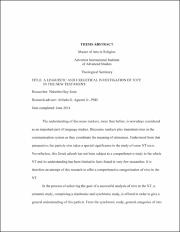A Linguistic and exegetical investigation of tote in the New Testament
Abstract
The understanding of discourse markers, more than before, is nowadays considered
as an important part of language studies. Discourse markers play important roles in the
communication system as they coordinate the meaning of utterances. Understood from that
perspective, the particle П„П„Оµ takes a special significance in the study of some NT texts.
Nevertheless, this Greek adverb has not been subject to a comprehensive study in the whole
NT and its understanding has been limited to facts found in very few researches. It is
therefore an attempt of this research to offer a comprehensive categorization of П„П„Оµ in the
NT.
In the process of achieving the goal of a successful analysis of П„П„Оµ in the NT, a
semantic study, comprising a diachronic and synchronic study, is offered in order to give a
general understanding of this particle. From the synchronic study, general categories of П„П„Оµ
and their functions are highlighted, setting the parameters for a subsequent pragmatic
analysis of the various occurrences of П„П„Оµ in the NT. It globally appears that П„П„Оµ in the NT
serves both as an adverb and as a conjunction. The adverbial usage exhibits temporal
indexicality, anaphora, and (con)sequence. Conjunctive П„П„Оµ is both sentence initial and
clause initial. Narrative П„П„Оµ is a peculiarity of some books and tends to be sentence initial.


